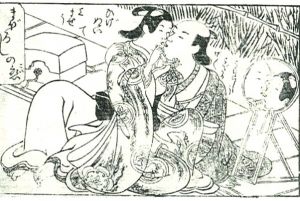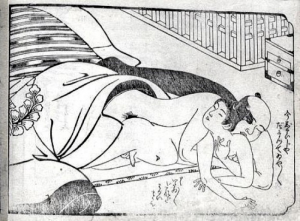(Boylove Documentary Sourcebook) - A Reversal of Conventional Pederastic Pursuit in a Chapter of 'The Life of an Amorous Man' by Ihara Saikaku: Difference between revisions
Replaced an image |
m Dandelion moved page (BLSB) - A Reversal of Conventional Pederastic Pursuit in a Chapter of 'The Life of an Amorous Man' by Ihara Saikaku to (Boylove Documentary Sourcebook) - A Reversal of Conventional Pederastic Pursuit in a Chapter of 'The Life of an Amorous Man' by Ihara Saikaku |
||
| (2 intermediate revisions by the same user not shown) | |||
| Line 7: | Line 7: | ||
<div style="margin:.5em auto; width:95%; min-height:5em; background-color:#F5FAFF; border:3px solid #c9c9ff; padding:1em;"> | <div style="margin:.5em auto; width:95%; min-height:5em; background-color:#F5FAFF; border:3px solid #c9c9ff; padding:1em;"> | ||
In a chapter missing from the abridged Kengi Hamada translation of <i>Amorous Man</i> (1963), at the tender age of ten the fantastically precocious Yonosuke reverses the reigning protocol of erotic pursuit by seducing an adult male into becoming his <i>nenja</i>. In a chapter set two decades later, the narrator reveals that Yonosuke’s erstwhile lover is a samurai, and the two tearfully reunite as the closest of friends, well after Yonosuke’s attainment of adulthood has rendered the sexual side of their relationship obsolete. | In a chapter missing from the abridged Kengi Hamada translation of <i>Amorous Man</i> (1963), at the tender age of ten the fantastically precocious Yonosuke reverses the reigning protocol of erotic pursuit by seducing an adult male into becoming his <i>[[nenja]]</i>. In a chapter set two decades later, the narrator reveals that Yonosuke’s erstwhile lover is a samurai, and the two tearfully reunite as the closest of friends, well after Yonosuke’s attainment of adulthood has rendered the sexual side of their relationship obsolete. | ||
</div> | </div> | ||
| Line 37: | Line 37: | ||
*[https://greek-love.com/far-east/japan/the-age-of-the-loved-boy-in-japan-pederasty THE AGE OF THE LOVED BOY IN TRADITIONAL JAPAN (Greek Love Through the Ages)] | *[https://greek-love.com/far-east/japan/the-age-of-the-loved-boy-in-japan-pederasty THE AGE OF THE LOVED BOY IN TRADITIONAL JAPAN (Greek Love Through the Ages)] | ||
[[Category:Boylove Sourcebook]] | [[Category:Boylove Documentary Sourcebook]] | ||
[[Category:Japanese literature]] | [[Category:Japanese literature]] | ||
[[Category:Boylove in literature]] | [[Category:Boylove in literature]] | ||
[[Category:Sexuality]] | [[Category:Sexuality]] | ||
[[Category:LGBT articles]] | [[Category:LGBT articles]] | ||
Latest revision as of 11:11, 3 November 2021

From "Samurai Lovers, 'Samurai Beasts': Warriors and Commoners in Ihara Saikaku's Way of the Warrior Tales" by David Gundry, in Japanese Studies, Vol. 35, No. 2 (September 2015). Footnotes omitted.
Note: Saikaku's novel was written at a time when Japan followed the East Asian age reckoning, by which people are born at the age of one, i.e. the first year of lifetime using an ordinal numeral (instead of "zero" using a cardinal numeral), and on Chinese New Year or New Year's Day one year is added to their age. Since age is incremented at the beginning of the lunar or solar year, rather than on the anniversary of a birthday, people may be one or two years older in Asian reckoning than in the international age system.[1]
In a chapter missing from the abridged Kengi Hamada translation of Amorous Man (1963), at the tender age of ten the fantastically precocious Yonosuke reverses the reigning protocol of erotic pursuit by seducing an adult male into becoming his nenja. In a chapter set two decades later, the narrator reveals that Yonosuke’s erstwhile lover is a samurai, and the two tearfully reunite as the closest of friends, well after Yonosuke’s attainment of adulthood has rendered the sexual side of their relationship obsolete.

References
See also
- The Great Mirror of Male Love (book)
- Adult friend (dictionary)
- Age of attraction (dictionary)
- Bishōnen
- Boylove
- Chigo monogatari
- Ephebophilia
- Historical boylove relationships in Japan
- Loved boy (dictionary)
- Manga and anime
- Minor-attracted person (dictionary)
- Pederasty
- Pedophilia
- Shōnen
- Young friend (dictionary)